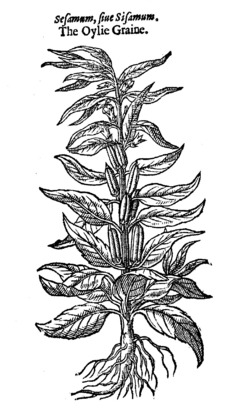
Gerard's Herbal

Fig. 1748. Sesame
The Description.
Sesamum hath a thick and fat upright stalk a cubit and a half high, garnished with leaves much like the Peach or Almond, but rougher, and cut in with somewhat deep gashes on their sides: flowers, somewhat shaped like those of Foxgloves, which turn into round long crested cods, containing white flat oleous seed. Theophrastus affirmeth that there is a kind thereof which is white, bearing only one root. No kind of beast will eat this plant while it is green, because of his bitterness; but being withered and dried, the seed thereof becometh sweet, and the cattle will feed on the whole plant.
The Place.
It groweth both in Egypt and in India: Sesama, saith Pliny, came from the Indies; they make an oil of it. It is a stranger in England.
The Time.
It is one of the summer grains, and is sown before the rising of the seven stars, as Pliny writeth; yet Columella saith, that Sesamum must be sown after the autumn against the Ides of October: they require for the most part a rotten soil, which the husbandmen of Campania do call a black mould.
The Names.
The Grecians call this grain Sesamon; the Latins also Sesamum, and Sisamum, and often in the feminine gender Sesama: we are constrained for want of an English name to use the Latin: it is unknown to the apothecaries, especially the plant itself; but the seed and oil thereof is to be found among them in other countries: we may call it Turkey Millet.
The Temperature and Virtues.
A. According to some it is hot and dry in the first degree: the seed thereof, as Galen saith, is fat, and therefore being laid up it cometh to be oily very quickly; wherefore it speedily filleth and stuffeth up those that feed thereof; and overthroweth the stomach, and is slow of digestion, and yieldeth to the body a fat nourishment: therefore it is manifest that it cannot strengthen the stomach, or any part thereof, as also no other kind of fat thing: and the juice that cometh thereof is thick, and therefore it cannot speedily pass through the veins. Men do not greedily feed of it alone, but make cakes thereofwith honey, which they call sesamidos: it is also mixed with bread, and is of an hot temperature, for which cause it procureth thirst: and in his book Of The Faculties of Simple Medicines he saith, that Sesamum is not a little clammy and fat, and therefore it is an emplastic, and a softener, and is moderately hot: the oil which cometh thereof is of like temperature, and so is the decoction of the herb also.
B. Dioscorides writeth, That Sesamum is an enemy to the stomach, it causeth a stinking breath, if it remain sticking between the teeth after it is chewed.
C. It wasteth away grossness of the sinews; it is a remedy against bruises of the ears, inflammations, burnings and scaldings, pains of the joints, and biting of the poisonsome horned serpent called Cerastes. Being mixed with oil of Roses it takes away the headache which cometh of heat.
D. Of the same force is the herb boiled in wine, but it is especially good for the heat and pain of the eyes.
E. Of the herb is made an oil used of the Egyptians, which as Pliny saith is good for the ears.
F. It is a remedy against the sounding and ringing of the ears.